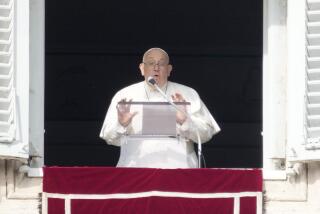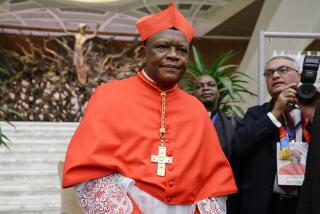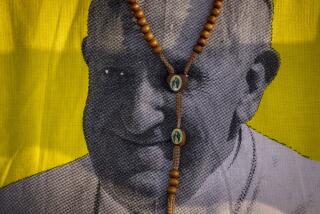Royals, Gays and the Double Standard
- Share via
The no-frills nuptials of Britain’s Prince Charles and divorcee Camilla Parker Bowles -- in which the couple had to settle for a blessing by the archbishop of Canterbury after a civil marriage -- were God’s gift to British satirists.
But they also were a high-profile reminder that some Anglicans (and other Christians) who oppose church blessings of same-sex couples read Holy Writ selectively. When St. Paul condemns homosexuality, he is to be taken literally; when Jesus condemns divorce, some of these sticklers for scriptural purity suddenly discover situation ethics.
Had the new duchess of Cornwall not been involved with Charles during his marriage to Princess Diana, she and the prince might have received a full-dress church wedding, with a mitered archbishop of Canterbury declaring them man and wife and not simply blessing a civil union.
But even the bargain-basement blessing bestowed on the couple by Archbishop of Canterbury Rowan Williams would be unavailable to same-sex couples under the approach taken by the so-called Windsor Report. This was issued last fall by a commission named by Williams to deal with dissension among Anglicans worldwide over homosexuality.
The report is best known for its call on the Episcopal Church of the United States to express regret over the ordination as a bishop of the openly gay Rt. Rev. V. Gene Robinson. But the report also targeted the New Westminster Diocese of the Anglican Church of Canada for approving blessing services for same-sex couples.
In both cases, in the view of evangelical Anglicans, the anything-goes North Americans had contravened the plain teaching of the Bible -- particularly St. Paul’s condemnation of men who “leaving the natural use of the woman, burned in their lust one toward another; men with men working that which is unseemly, and receiving in themselves that recompense of their error which was meet.” The Very Rev. Colin Slee, dean at the Southwark Cathedral in London, sees a double standard in the way supposed sticklers for Scripture react to homosexuality and divorce.
“Our Lord had direct and firm things to say in the Gospels about divorce, but nothing about homosexuality,” Slee wrote in an essay in “Windsor: A Liberal Response.” But, despite Jesus’ clear condemnation of divorce, he noted, many evangelical Anglican clergy conducted second marriages long before it was permitted by the church.
In a conversation in his office last week, Slee made the point more pithily: “They break the rules for heterosexual couples. It’s a classic case of ‘Heads you win, tails I lose.’ ” If Slee were debating anti-gay evangelical Anglicans on the old “Crossfire” television program, a gong would have to be sounded here. His argument that the evangelicals take some parts of the Bible literally while giving others a more nuanced interpretation is irrefutable. But even Slee concedes that this deft debating point won’t change any minds on the other side.
“They are completely hooked on this one issue,” he said of the evangelical Anglicans who have threatened schism over accommodations to gays and lesbians. “They have made it the touchstone of all debate.” He said there is “no mileage” to be made by liberals in pointing out that anti-gay evangelicals are willing to make arguably unscriptural allowances for Camilla and other less-well-connected divorcees.
The interesting question is why the evangelicals are impervious to that argument and its exposure of their double standard.
One answer is that, despite their protestations that the plain language of Scripture is their guide, these “low church” Protestants have more in common than they might like to admit with Roman Catholic theologians who ground their opposition to homosexual acts in “natural law.” Whether it is potential pope Cardinal Joseph Ratzinger talking about a divinely ordained “complementarity” between the sexes, or Bible Belt Americans pointing out that God created “Adam and Eve, not Adam and Steve,” much of the religious opposition to gay relationships seems rooted in a fear that acknowledging -- and blessing -- such relationships would somehow devalue heterosexual marriage.
The challenge for Christians who preach a more compassionate Gospel is to convince wary evangelicals and ecclesiastics alike that there is wisdom, and maybe even some divine inspiration, in the paradoxical popular saying that the exception proves the rule.
If Charles and Camilla can receive a blessing for a loving union that is less than ideal from the church’s perspective, why can’t gays and lesbians?
Michael McGough is the Washington-based editor at large for the Pittsburgh Post-Gazette.
More to Read
Sign up for Essential California
The most important California stories and recommendations in your inbox every morning.
You may occasionally receive promotional content from the Los Angeles Times.














